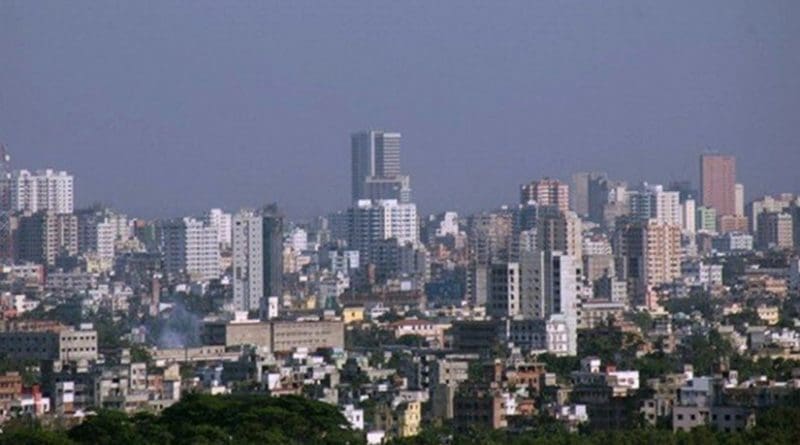Black Friday In Bangladesh: Failed Syria Policy Threatens Global Peace – OpEd
By Bhaswati Mukherjee*
Friday, July 1, 2016, was the last Friday of Ramadan, a week before Eid, an auspicious day for Muslims worldwide. Ironically, it was also on a Friday, the 13th of November, 2015, that the worst terrorist attack by IS in Europe (France) took place, a day of calamity and bloodshed involving the horrific slaughter of innocent civilians. The same tragedy was repeated in Dhaka on what is now being called the ‘Black Friday’ of July 1, 2016. For us in India, it was a chilling recollection of Mumbai and later attacks, including on the German Bakery in Pune, with a similar pattern of a cowardly heinous assault, carefully timed in a posh upmarket area of the city when the residents were enjoying Iftar and breaking of the fast. As in Mumbai, Pune, Paris and other destinations, the victims were always innocent vulnerable civilians.
What Dhaka witnessed in Gulshan, an affluent diplomatic enclave, was the deadliest and boldest act of terror in a country that has unfortunately become increasingly numb to ever-escalating violence by Islamist militants on Bangladeshis and foreigners. It was both an assault and a warning to the local expat community since Gulshan represents Dhaka’s equivalent of a diplomatic enclave. Despite the fact that all the attackers were reportedly Bangladeshi citizens, with five being known militants, it is difficult to accept the Bangladesh Prime Minister Sheikh Hasina’s assertion and insistence that these were all home-grown terrorists. Speaking on television, an emotional Sheikh Hasina said: “It was an extremely heinous act. What kind of Muslims are these people? They don’t have any religion”. Sheikh Hasina added: ‘Islam is a religion of peace. Stop killing in the name of the religion. Please stop tarnishing our noble religion…I implore you to come back to the rightful path and uphold the pride of Islam.’
Intelligence reports originally were divided on whether the attack was by Al Qaeda branch in South Asia or by the IS. Initial reports noted that it was more likely that Al Qaida in the Indian subcontinent conducted this attack because it had demonstrated a more consistent presence in Bangladesh through several recent attacks. But after images were posted on Amaq, an ISIS affiliated website, approximately 90 minutes before the restaurant was stormed by elite Bangladeshi commandoes, showing the inside of the restaurant with graphic photos of dead hostages, American and Indian intelligence agencies are reportedly focussing on the IS connection.
The story of the Indian victim is particularly poignant. Tarishi Jain, 19, a student of economics at the University of California, Berkley, had gone for a family reunion which went horribly wrong. Hidden in the toilet for over seven hours while the terrorists butchered, tortured and slit open the throats of non-Muslims and foreigners, her luck ran out at 4 a.m. local time when she was gunned down with two of her friends. Other victims included nine Italians who reportedly worked in the garment business, seven Japanese who had come to meet a corporate client, one US citizen of Bangladeshi origin and two Bangladeshis. According to eyewitness account of the survivors, those present in the restaurant were quickly divided into two groups – those who could recite verses from Quoran were spared and even given a meal. The others were slaughtered.
While it would be premature at this stage to speculate on the perpetrators of the attack , their motives and the lessons to be drawn for India, one troubling conclusion would appear to be that whether “home-grown” or not, the IS appears to be embarking on a serious attempt to indoctrinate Bangladeshi youth. Increasingly under challenge in Iraq and Syria, the IS desperately need new recruits. There are already alarming intelligence reports based on a new propaganda video of the IS that Indian fighters are being recruited to fight against Syrian forces. After a long and difficult summer, we need to, as a nation, gear up to the troubling possibility of similar copycat attacks on vulnerable targets in our huge metropolitan cities. It remains to be seen whether the lone surviving militant, Bangladesh’s Ajmal Kasab, will be able to throw some light on the motives, agenda and future plans of these IS-trained jehadis.
What appears to be certain is that the failed Syria policy of US and Europe, which gave rise to the IS in the first instance, has created a monster that is increasingly challenging international peace and security. For Bangladesh herself, proud of her national heritage which includes RabindranathTagore and Kazi Nazrul Islam, this is a time for grieving, remembering and healing. This may also be an appropriate moment for the bereaved nation to recall a poignant prayer of a tired traveller in Gurudev’s Geetanjali:
“If the day ends, if birds sing no more,
If the spent wind stops blowing –
Wrap me up on all sides with a veil,
Cover me tenderly in profound darkness –
Remove my shame; nurse me through the night,
Let me blossom again at a new dawn.”
*Bhaswati Mukherjee is a former Indian Ambassador. She can be contacted at: [email protected]

